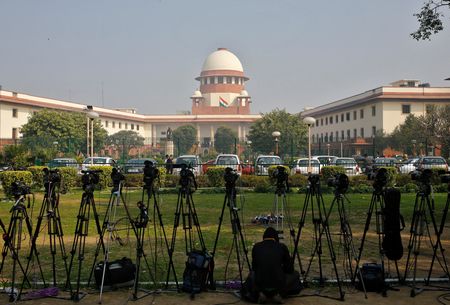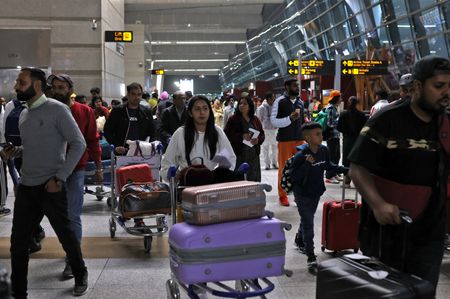By Aditya Kalra and Arpan Chaturvedi
NEW DELHI (Reuters) -Foreign lawyers who fly into India to handle client matters will now have to inform the country’s bar council before they come and will also have to disclose some client details, according to new rules published this week.
The rules are part of detailed regulations that follow India’s 2023 decision to permit foreign law firms to open India offices and advise in non-litigious, foreign or international law in areas such as M&A and corporate law.
Prior to that, India only allowed a fly-in and fly-out system for foreign lawyers.
But foreign lawyers who don’t open offices and want to continue flying in now face stricter requirements – namely, filling in a declaration disclosing the client’s name and contact information. The rules reiterated that lawyers can’t stay in India for more than 60 days in a 12-month period.
“Any foreign lawyer or law firm shall be required to inform the Bar Council of India before its arrival in India and shall also intimate about the details of the work and its duration of its stay in India,” said the rules.
Though most transactions, even big-ticket ones, can be wrapped up in 60 days, the time limit on stays and other compliance measures are contrary to the intent of liberalising the industry, lawyers said.
“Under garb of relaxing barriers, this is actually like taking several steps backwards,” said Akash Karmakar, a partner at Indian law firm Panag & Babu, which works with foreign lawyers who regularly visit India for transactions.
“Indian clients want foreign lawyers to come in and advise on subjects like foreign stock listings. That work will slow down due to added compliance for foreign lawyers.”
The Bar Council did not respond to a request for comment. In its press statement on Wednesday, it described the requirements as “strict guidelines” aimed at protecting the interests of Indian lawyers.
The entry of foreign law firms into India has been a contentious issue, and the Bar Council opposed the move for years, fearing the impact on local lawyers.
Salman Waris, managing partner at Indian law firm TechLegis, added the new rules would “frustrate international lawyers and force them to setup formal offices and cause concerns about client confidentiality due to information sharing with the Bar Council.”
The new rules also stipulate that law firms intending to set up India offices will also need to submit a no-objection certificate from the Indian government “stating that an effective legal system” exists in foreign countries whose laws the applicant wishes to practice in India.
The first set of rules in 2023 have not yet led to a flurry of major foreign law firms setting up India offices, but lawyers said Wednesday’s rules are likely to offer more clarity and speed up market entries.
(Reporting by Aditya Kalra and Arpan Chaturvedi; Editing by Edwina Gibbs)










